Unit 3 教材听力原文及译文
新标准Unit3听力原文
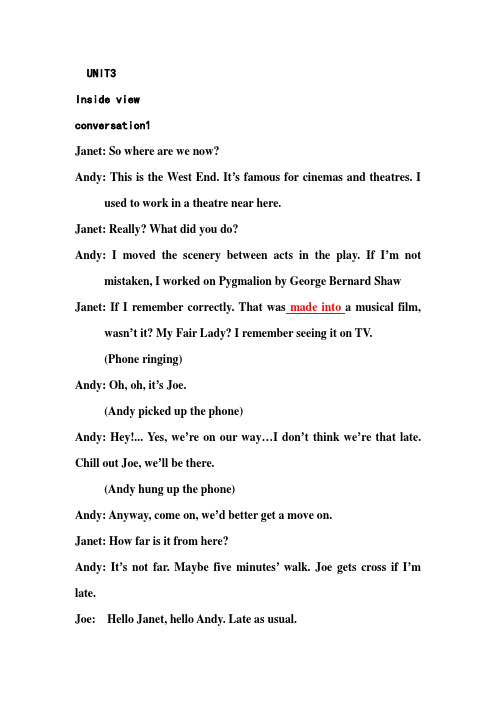
UNIT3Inside viewconversation1Janet: So where are we now?Andy: This is the West End. It’s famous for cinemas and theatres. I used to work in a theatre near here.Janet: Really? What did you do?Andy: I moved the scenery between acts in the play. If I’m not mistaken, I worked on Pygmalion by George Bernard Shaw Janet: If I remember correctly. That was made into a musical film, wasn’t it? My Fair Lady? I remember seeing it on TV.(Phone ringing)Andy: Oh, oh, it’s Joe.(Andy picked up the phone)Andy: Hey!... Yes, we’re on our way…I don’t think we’re that late. Chill out Joe, we’ll be there.(Andy hung up the phone)Andy: Anyway, come on, we’d better get a move on.Janet: How far is it from here?Andy: It’s not far. Maybe five minutes’walk. Joe gets cross if I’m late.Joe: Hello Janet, hello Andy. Late as usual.Andy: Actually, by my watch, I’m bang on time.Joe: Well let’s get on with it. This is Toby Jenkins, the theatre critic. Toby: Nice to meet you, are you ready to start?Andy: Hang on a minute! Janet, can you check the sound level? Can you hear me ok ,Janet?Janet?Janet: Hi Andy, I can’t hear you. What’s up?Andy: Can you hear me now?Janet: Ouch! Yes, that’s much louder.Joe: Let’s stop wasting time please. Just get on with the interview, will you?Conversation2Andy: And we’ve got Toby Jenkins here with us today, who has just been to see the latest show at The Hippodrome La Clique. So La Clique is slightly different from the usual shows we see here in the West End these days. Can you tell me something about it, Toby? Toby: Yes, It’s a kind of cabaret, with a series of variety acts set in a kind of circus, but it’s very contemporary, extremely well produced and huge fun..Andy: Tell me more about the acts.Toby: Well, there are stunts performed on a high wire, and puppets.There’s a sword swallower and juggler, and a rubber man who manages to pass his whole body through a tennis racquet.Andy: It sounds very unusual.Toby: Yes, for the West End today, but not so unusual for 30 or more years ago.Andy: So, It’s family entertainment then?Toby: Ah, no. I’m afraid it’s pretty adult, but very funny and stylish. Andy: Did you get that ok, Janet?Joe: Let me have a listen…Janet: Oh no, did I do some thing wrong?Joe: Well, It’s just that I can’t hear anything. Let’s try again…Andy: Did you remember to keep an eye on the sound levels? That meter, there!.Janet: Oh no, I clean forgot.Andy: It’s Ok. We’ll just do another take.Joe: Come on you two. Hurry up!Janet: I’m so sorry. It slipped my mind.Joe: You’ll forget your own head one day. Sorry about this, Toby. From the top, please.Andy: And we’ve got Toby Jenkins here with us today…Outside ViewThe Mona Lisa, the most famous painting in the world, was trully revolutionary even in its time. While he was painting the MonaLisa, Leonardo da Vinci broke all the rules, even his own. In spite of the fact that Leonardo and other aritists believed that women should only be portrayed with eyes gazing slightly down. Leonodo painted the Mona Lisa looking directly at the viewer. The positon of her body is another innovation. While her face looks straight ahead, her body is slight turned, a pose that creates a sense of movement and tension. In another break from tradition, the Mona Lisa is not wearing any jewellery or adorments. Finally, backgrounds in portraits usually indicated a real place but the landscape in Leonardo’s portrait seems almost imaginary.A:One of the things I like to do is, um, think about her face and why, what is she trying, why, what is she trying to say with her face and I used to think that her face told more than one story. For instance, if I covered up one side of her face, it seemed like she might be a little sad or resevered, almost secretive.S:Her eyes are, they’re kind of looking at us or around us, through us perhaps. I think with that painting she is the viewer and we are the subject in a way. And she has this look that she knows somehting that we don’t know.A:And then when I coverd up that side and looked at the other side, she seemed happier, um, more satisfied. And togher, it created sort of the mystery about her that, um, made interpreting her facevery enigmatic.S:There’s speculation that the Mona Lisa is a self-portrait of Leonardo and I, I believe that it is, there, there, the features do line up between the Mona Lisa and sketches of Leonardo.Scott McMahon and Anne Pfaff are both portrait artists. They believe that portraits can tell a story and make people think, just as the Mona Lisa has done for so many years.A:When I was young, um, I was always interested in, um, reading books about people and, and the dynamics, different kinds of relationships they had and so when I became a painter it was natural for me to be interested in painting people and looking for similar kinds of stories to tell about them that you might read in a book.S:Uh, most of my work consists of photographic摄影的self-portraiture. Um, I’m interested in using myself as the subject, um, not only as the creator of the image but as the, the character, or the performer of, of the images. So in my portraits I’m trying to capture, um, a deeper essence本质,实质of a person, um, more or less. This work here is done with a pinhole camera, which requires a very long exposure曝光时间so, with a portrait you can get this feeling of time passed. It’s not a, it’s not an instant, per se, it could be five minutes of exposure.A:So this is another project I’m working on. I’m almost finishedwith it but I still need to work on the reflections in the water, um, and the face of the boy before it’s finished.S:I often work with multiples and, you know, using a mirror or the same image twice and what I wanted to do was link the two portraits together with the string. It’s kind of the string of thought or this idea of remembering or the resilience恢复力,复原力of memory.A:I don’t just paint from photographs. I try to make a work of art. Um, I try to make a painting that goes beyond a mere 仅仅的,只不过photographic image. I try to capture something about the soul of the, or the essence of this person.S:This piece here is, uh, it’s called The Measure of Decay and behind the piece there are portraits, again, of me I have this clay covering on that has cracked破裂and so it’s, it’s kind of like the process of decay. So as each portrait goes around you can, you can see the image in a different focus. I love painting portraits.A:I love painting but portraits are very special because they’re about people.S:I’m fascinated by portraiture in general, and the human body and how the image lives over time. I like to capture what is unique and special about an individual in paint.Listening in conversation 1Lily: So what was the highlight of your trip to (South)Korea? Hugh: Well that's…let me see...it's got to be going to see Nanta.Lily:What on earth is Nanta?Hugh:It's this amazing live show-part theater-part dance-part music. Lily: Sounds really interesting. But why’s it so brilliant?Hugh: I think it's the energy of the performers. Also it has a unique concept. It's a mixture of traditional Korean music,percussion and drums, into a western style performance Lily: I've never heard of it. Has it ever been performed in the West? Hugh: Yeah, it's been a sell-out. They've toured in over 30 countries since the show began in 1997.It's a non-verbal performance sothere are no language barriers. That's what's made it aninternational success.Lily: What else makes it so special then?Hugh: Well...the other thing is that all the action takes place in the kitchen. You see these four chefs preparing the food for awedding reception. The performers use knives, dustbin lidsand various other kitchen utensils to create a hypnoticsoundtrack. The food literally flies everywhere! It's hilarious. Lily: That sounds quite funny I must admit. Is there an actual story though?Hugh: Oh yes, there is a story. The four chefs have to prepare themeal by 6 o'clock and they also have to give the manager'snephew cooking lessons too, which adds to the fun. There’sloads of audience participation and despite there being nolanguage involved you get completely engrossed. It's reallyquite wacky!Lily: And what about the audience? I suppose they start throwing food around…?Hugh: Not quite! But they are totally involved in what's going on-everyone loves it. It's a really great family show. In fact it'sone of the best shows I've ever seen. Jim, my friend, says hetakes all his visitors. He's seen it about eight times and stillloves it.Lily: I bet it's popular with tourists then.Hugh: Well apparently over a million foreign tourists in (South)Korea have seen the show and it's had a run onBroadway too. It first got popular after they appeared at theEdinburgh Festival. Now they are planning to tour more citiesin Asia where (South) Korean popular culture is becomingincredibly trendy.Lily:By the way what does“Nanta” mean?Hugh:It means random drumming in Korean. The English name for the show is Cookin’, which gives you a clearer idea of what it'sall about.Lily:You've got me interested now. I'll have to check it out on the internet.Listening inConversation 2Interviewer: Kathy Richards is a specialist art tour guide. Kathy-can you tell us what trends you've noticed in recent years? Kathy: Well, one of the biggest phenomena I've noticed is a huge increase in visitors to galleries-and a growing interest inmodern art in general.Interviewer: What do you think the reason is for that?Kathy: Well, there are several reasons, I think. The most important ones are firstly, that some new contemporaryart galleries have opened which have had a lot ofpublicity, and secondly the younger generation feel morecomfortable with modern art so the kind of peoplevisiting galleries is changing. Finally, the new generationof galleries have become destinations in themselves...theytend to be housed in amazing buildings.Interviewer: So which are the most popular new galleries?Kathy: Well, the Tate Modern in London has had over 30 millionvisitors since it opened in 2000.The annual average is nowover 4.5 million. The Museum of Modern Art, or MoMAin New York is an older gallery, it was founded in 1929but has been recently renovated and expanded. This workwas finished in 2006 and it had over 2.5 million visitors inthe first year after reopening. Another very successfulnew gallery is the Guggenheim in Bilbao in Spain. Itopened in 1997 and now gets about a million visitors ayear.Interviewer: Those are pretty impressive figures. Maybe the fact that the Tate Modern is free to visit might have something todo with it?Kathy: It's true that entrance to the permanent collection is free but the numbers of people visiting the temporaryexhibition are also high-and the entrance fee is usuallyabout ten pounds.Interviewer: Do you have to pay to get into the other galleries you mentioned?Kathy: Oh yes. You do. Admission to MoMA is 20 US dollars and the Guggenheim in Bilbao costs eight euros. Interviewer: Do people mind paying, do you think?Kathy: No, I don't think they do mind. Most people feel the feesare reasonable considering the outstanding collections ofpriceless works of art that they get to see.Interviewer: You mentioned that the buildings that art galleries are in can be an attraction themselves these days...Kathy: Well, yes, the Guggenheim has literally revitalized the whole city and put Bilbao on the tourist map. It's got afuturistic, curvy metallic structure and people love it. TheTate Modern has helped redevelop an old industrial areabeside the River Thames. The gallery itself is actuallyinside a huge , old, brick power station. And MoMA isinteresting as it's in downtown New York. Interviewer: And who visits these galleries? What's the profile of the average art lover?Kathy: Well, in the past museums and galleries were seen as appealing to the older generation. But in fact, 48 percentof visitors to the Tate Modern are under 35...。
人教版七年级下册英语 教学资源包 Unit 3 教材听力原文及译文
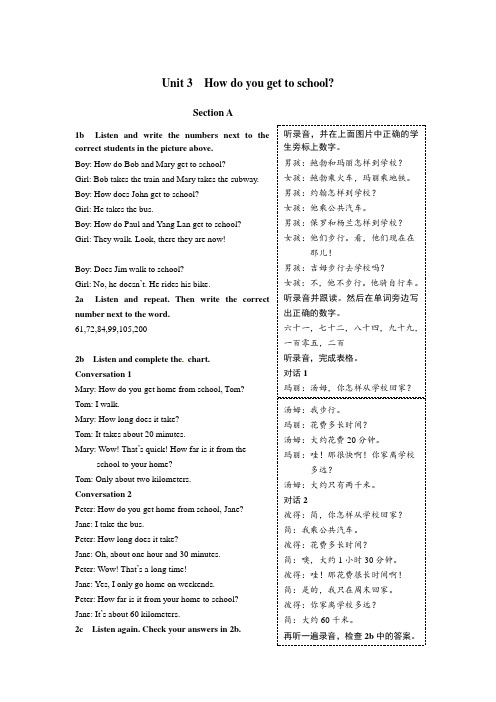
Unit 3 How do you get to school?Section A1b Listen and write the numbers next to the correct students in the picture above.Boy: How do Bob and Mary get to school?Girl: Bob takes the train and Mary takes the subway. Boy: How does John get to school?Girl: He takes the bus.Boy: How do Paul and Yang Lan get to school?Girl: They walk. Look, there they are now!Boy: Does Jim walk to school?Girl: No, he doesn’t. He rides his bike.2a Listen and repeat. Then write the correct number next to the word.61,72,84,99,105,2002b Listen and complete the chart. Conversation 1Mary: How do you get home from school, Tom? Tom: I walk.Mary: How long does it take?Tom: It takes about 20 minutes.Mary: Wow! That’s quick! How far is it from the school to your home?Tom: Only about two kilometers.Conversation 2Peter: How do you get home from school, Jane? Jane: I take the bus.Peter: How long does it take?Jane: Oh, about one hour and 30 minutes.Peter: Wow! That’s a long time!Jane: Yes, I only go home on weekends.Peter: How far is it from your home to school? Jane: It’s about 60 kilometers.2c Listen again. Check your answers in 2b. 听录音,并在上面图片中正确的学生旁标上数字。
新人教版七年级(上册)Unit 3 听力文本及翻译

新人教版七年级(上册)Unit 3 听力文本及翻译My School我的学校BIG Question. What do you like about your school?大问题。
你喜欢你的学校什么?In this unit, you will:在本单元中,你将:1. talk about places in school.谈论学校里的地方。
2. describe locations using there be structure and prepositions of position.使用there be结构和位置介词描述位置。
3. introduce and talk about your school.介绍并谈论你的学校。
4. describe the places you like in your school and explain why. 描述你喜欢的学校里的地方并解释原因。
Look and share看并分享1. What is this place in the photo?照片中的这个地方是什么?2. What are the people doing on the sports field?人们在运动场上做什么?3. What do you like to do at school?你在学校喜欢做什么?SECTION AA节What is your school like?你的学校怎么样?1a. Look at the picture. Talk about the positions of the places with the words in the box.1a. 看图。
用框中的词语谈论各个地方的位置。
Where’s the dining hall?餐厅在哪里?It’s in front of the art building.在艺术楼的前面。
in front of. behind. next to. between. across from在...前面。
人教版英语七年级下册Unit 3听力原文及翻译
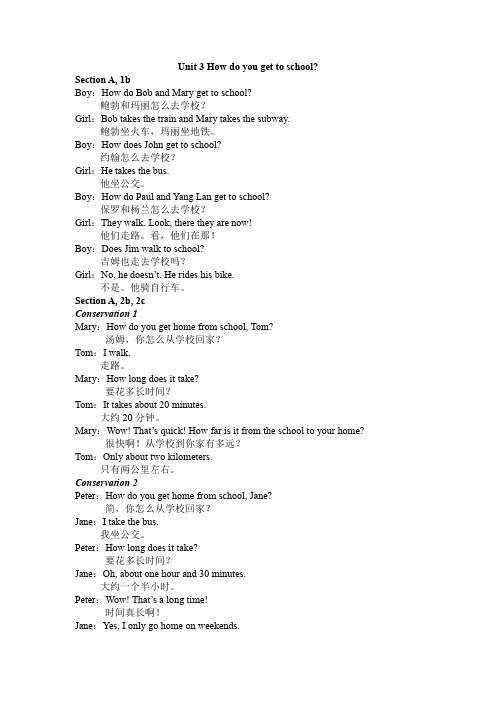
Unit 3 How do you get to school?Section A, 1bBoy:How do Bob and Mary get to school?鲍勃和玛丽怎么去学校?Girl:Bob takes the train and Mary takes the subway.鲍勃坐火车,玛丽坐地铁。
Boy:How does John get to school?约翰怎么去学校?Girl:He takes the bus.他坐公交。
Boy:How do Paul and Yang Lan get to school?保罗和杨兰怎么去学校?Girl:They walk. Look, there they are now!他们走路。
看,他们在那!Boy:Does Jim walk to school?吉姆也走去学校吗?Girl:No, he doesn’t. He rides his bike.不是。
他骑自行车。
Section A, 2b, 2cConservation 1Mary:How do you get home from school, Tom?汤姆,你怎么从学校回家?Tom:I walk.走路。
Mary:How long does it take?要花多长时间?Tom:It takes about 20 minutes.大约20分钟。
Mary:Wow! That’s quick! How far is it from the school to your home?很快啊!从学校到你家有多远?Tom:Only about two kilometers.只有两公里左右。
Conservation 2Peter:How do you get home from school, Jane?简,你怎么从学校回家?Jane:I take the bus.我坐公交。
Peter:How long does it take?要花多长时间?Jane:Oh, about one hour and 30 minutes.大约一个半小时。
人教版英语八年级上册Unit 3听力原文及翻译
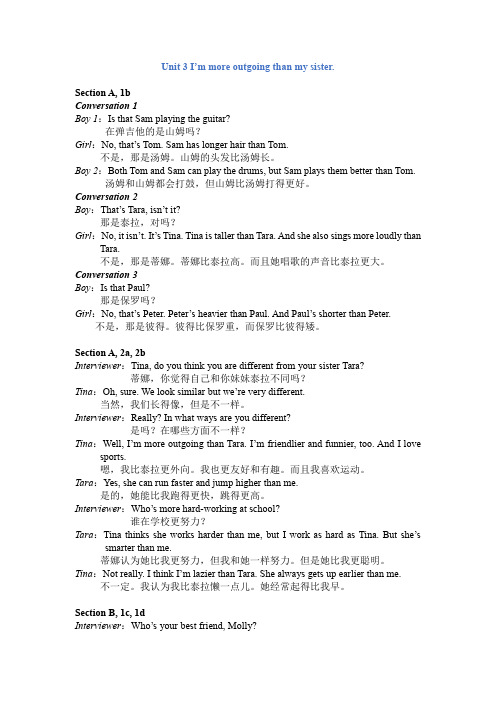
Unit 3 I’m more outgoing than my sister.Section A, 1bConversation 1Boy 1:Is that Sam playing the guitar?在弹吉他的是山姆吗?Girl:No, that’s Tom. Sam has longer hair than Tom.不是,那是汤姆。
山姆的头发比汤姆长。
Boy 2:Both Tom and Sam can play the drums, but Sam plays them better than Tom.汤姆和山姆都会打鼓,但山姆比汤姆打得更好。
Conversation 2Boy:That’s Tara, isn’t it?那是泰拉,对吗?Girl:No, it isn’t. It’s Tina. Tina is taller than Tara. And she also sings more loudly than Tara.不是,那是蒂娜。
蒂娜比泰拉高。
而且她唱歌的声音比泰拉更大。
Conversation 3Boy:Is that Paul?那是保罗吗?Girl:No, that’s Peter. Peter’s heavier than Paul. And Paul’s shorter than Peter.不是,那是彼得。
彼得比保罗重,而保罗比彼得矮。
Section A, 2a, 2bInterviewer:Tina, do you think you are different from your sister Tara?蒂娜,你觉得自己和你妹妹泰拉不同吗?Tina:Oh, sure. We look similar but we’re very different.当然,我们长得像,但是不一样。
Interviewer:Really? In what ways are you different?是吗?在哪些方面不一样?Tina:Well, I’m more outgoing than Tara. I’m friendlier and funnier, too. And I love sports.嗯,我比泰拉更外向。
人教版英语九年级全一册Unit 3听力原文及翻译
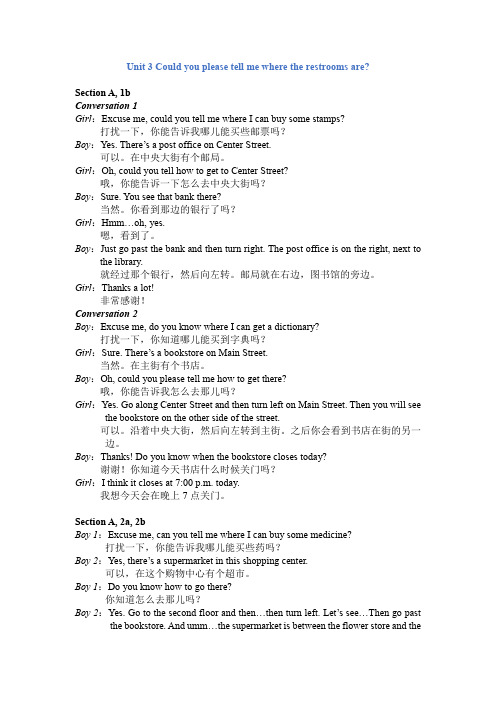
Unit 3 Could you please tell me where the restrooms are?Section A, 1bConversation 1Girl:Excuse me, could you tell me where I can buy some stamps?打扰一下,你能告诉我哪儿能买些邮票吗?Boy:Yes. There’s a post office on Center Street.可以。
在中央大街有个邮局。
Girl:Oh, could you tell how to get to Center Street?哦,你能告诉一下怎么去中央大街吗?Boy:Sure. You see that bank there?当然。
你看到那边的银行了吗?Girl:Hmm…oh, yes.嗯,看到了。
Boy:Just go past the bank and then turn right. The post office is on the right, next to the library.就经过那个银行,然后向左转。
邮局就在右边,图书馆的旁边。
Girl:Thanks a lot!非常感谢!Conversation 2Boy:Excuse me, do you know where I can get a dictionary?打扰一下,你知道哪儿能买到字典吗?Girl:Sure. There’s a bookstore on Main Street.当然。
在主街有个书店。
Boy:Oh, could you please tell me how to get there?哦,你能告诉我怎么去那儿吗?Girl:Yes. Go along Center Street and then turn left on Main Street. Then you will see the bookstore on the other side of the street.可以。
八下Unit3课文和听力材料译文(1)
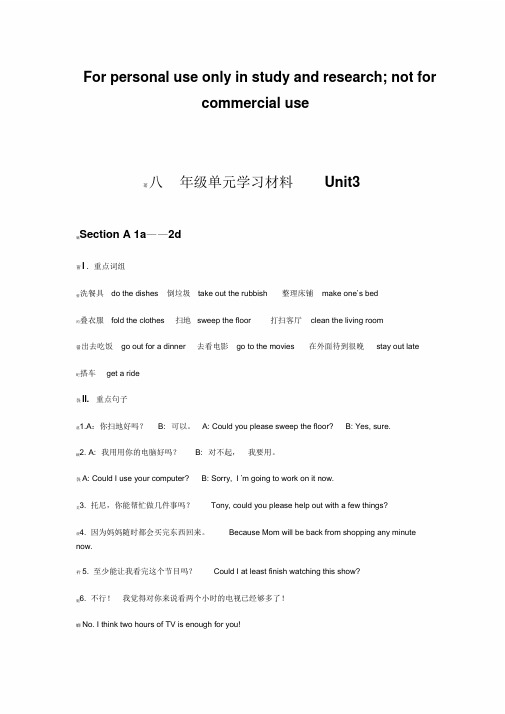
For personal use only in study and research; not forcommercial use年级单元学习材料Unit3莃八ection A 1a——2d羈S薈I .重点词组do the dishes 倒垃圾take out the rubbish 整理床铺make one’s bed蒆洗餐具fold the clothes 扫地sweep the floor 打扫客厅clean the living room袀叠衣服羀出去吃饭go out for a dinner 去看电影go to the movies 在外面待到很晚stay out lateget a ride蚆搭车袅II. 重点句子薀1.A:你扫地好吗?B: 可以。
A: Could you please sweep the floor? B: Yes, sure.螇2. A: 我用用你的电脑好吗?B: 对不起,我要用。
袅A: Could I use your computer? B: Sorry, I ’m going to work on it now.芄3. 托尼,你能帮忙做几件事吗?Tony, could you please help out with a few things?莀4. 因为妈妈随时都会买完东西回来。
Because Mom will be back from shopping any minute now.衿5. 至少能让我看完这个节目吗?Could I at least finish watching this show?膇6. 不行!我觉得对你来说看两个小时的电视已经够多了!螄No. I think two hours of TV is enough for you!肁7. 如果她看到家里乱糟糟会不高兴的。
She won’t be happy if she sees the mess.袀III .听力材料S ection A 1b芅膃Mom: Peter, we need to clean the house. Your grandma is coming over at seven. 皮特,我们需要来过打扫房子了,你奶奶七点钟袁Peter: Sure, but I need to do my homework first. 当然,但是我需要先做功课蚇Mom: OK. Then after you finish your homework, let ’s clean up the kitchen. I can do the dishes and sweep the floor. Could you please take out the rubbish? 可以。
2014-2015学年九年级英语(上)UNIT 3 教材听力原文及汉语翻译

UNIT 3Section A1b Listen and complete the conversations in the picture in 1a.Conversation lGirl: Excuse me, could you tell me where I canbuy some stamps?Boy: Yes. There’s a post offic e on Center Street. Girl: Oh, could you tell me how to get to Center Street?Boy: Sure. You see that bank there?Girl: Hmm…oh, yes.Boy: Just go past the bank and then turn right. The post office is on the right, next to the library. Girl: Thanks a lot!Conversation 2Boy: Excuse me, do you know where I can get a dictionary?Girl: Sure. There’s a bookstore on Main Street. Boy: Oh, could y ou please tell me how to get there?Girl: Yes. Go along Center Street and then turn left on Main Street. Then you will see the bookstore on the other side of the street. Boy: Thanks! Do you know when the bookstore closes today?Girl: I think it closes at 7:00 p.m. t oday.2a Listen. You will hear some of the directions below. Number the directions in the order you hear them.Boy 1: Excuse me, can you tell me where I can buy some medicine?Boy 2: Yes, there’s a supermarket in this shopping center.Boy 1: Do you know how to go there?Boy 2: Yes. Go to the second floor and then…then turn left. Let’s see…Then go past thebookstore. And umm…the supermarket isbetween the flower store and the bookstore.You should be able to get medicine there. Boy 1: OK, great. Oh, and one more thing. Do you know when this shopping center closestonight? 听录音,并完成1a图片中的对话。
人教版英语八年级下册Unit 3听力原文及翻译
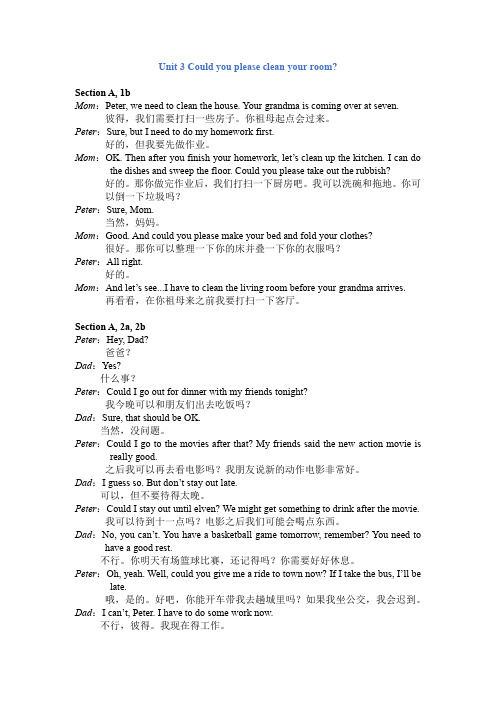
Unit 3 Could you please clean your room?Section A, 1bMom:Peter, we need to clean the house. Your grandma is coming over at seven.彼得,我们需要打扫一些房子。
你祖母起点会过来。
Peter:Sure, but I need to do my homework first.好的,但我要先做作业。
Mom:OK. Then after you finish your homework, let’s clean up the kitchen. I can do the dishes and sweep the floor. Could you please take out the rubbish?好的。
那你做完作业后,我们打扫一下厨房吧。
我可以洗碗和拖地。
你可以倒一下垃圾吗?Peter:Sure, Mom.当然,妈妈。
Mom:Good. And could you please make your bed and fold your clothes?很好。
那你可以整理一下你的床并叠一下你的衣服吗?Peter:All right.好的。
Mom:And let’s see...I have to clean the living room before your grandma arrives.再看看,在你祖母来之前我要打扫一下客厅。
Section A, 2a, 2bPeter:Hey, Dad?爸爸?Dad:Yes?什么事?Peter:Could I go out for dinner with my friends tonight?我今晚可以和朋友们出去吃饭吗?Dad:Sure, that should be OK.当然,没问题。
Peter:Could I go to the movies after that? My friends said the new action movie is really good.之后我可以再去看电影吗?我朋友说新的动作电影非常好。
九年级英语(上)UNIT 3 教材听力原文及汉语翻译
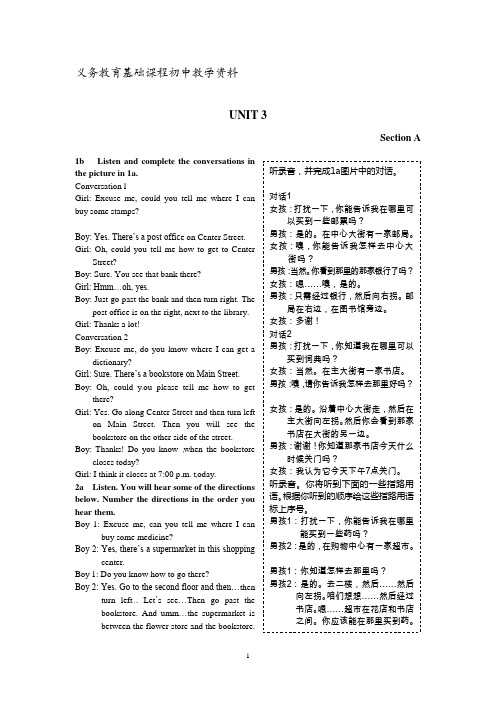
义务教育基础课程初中教学资料UNIT 3Section A1b Listen and complete the conversations in the picture in 1a.Conversation lGirl: Excuse me, could you tell me where I can buy some stamps?Boy: Yes. There’s a post offic e on Center Street. Girl: Oh, could you tell me how to get to Center Street?Boy: Sure. You see that bank there?Girl: Hmm…oh, yes.Boy: Just go past the bank and then turn right. The post office is on the right, next to the library. Girl: Thanks a lot!Conversation 2Boy: Excuse me, do you know where I can get a dictionary?Girl: Sure. There’s a bookstore on Main Street. Boy: Oh, could y ou please tell me how to get there?Girl: Yes. Go along Center Street and then turn left on Main Street. Then you will see the bookstore on the other side of the street. Boy: Thanks! Do you know when the bookstore closes today?Girl: I think it closes at 7:00 p.m. t oday.2a Listen. You will hear some of the directions below. Number the directions in the order you hear them.Boy 1: Excuse me, can you tell me where I can buy some medicine?Boy 2: Yes, there’s a supermarket in this shopping center.Boy 1: Do you know how to go there?Boy 2: Yes. Go to the second floor and then…then turn left. Let’s see…Then go past thebookstore. And umm…the supermarket isbetween the flower store and the bookstore. 听录音,并完成1a图片中的对话。
八下Unit3课文和听力材料译文(1)

For personal use only in study and research; not forcommercial use年级单元学习材料Unit3莃八ection A 1a——2d羈S薈I .重点词组do the dishes 倒垃圾take out the rubbish 整理床铺make one’s bed蒆洗餐具fold the clothes 扫地sweep the floor 打扫客厅clean the living room袀叠衣服羀出去吃饭go out for a dinner 去看电影go to the movies 在外面待到很晚stay out lateget a ride蚆搭车袅II. 重点句子薀1.A:你扫地好吗?B: 可以。
A: Could you please sweep the floor? B: Yes, sure.螇2. A: 我用用你的电脑好吗?B: 对不起,我要用。
袅A: Could I use your computer? B: Sorry, I ’m going to work on it now.芄3. 托尼,你能帮忙做几件事吗?Tony, could you please help out with a few things?莀4. 因为妈妈随时都会买完东西回来。
Because Mom will be back from shopping any minute now.衿5. 至少能让我看完这个节目吗?Could I at least finish watching this show?膇6. 不行!我觉得对你来说看两个小时的电视已经够多了!螄No. I think two hours of TV is enough for you!肁7. 如果她看到家里乱糟糟会不高兴的。
She won’t be happy if she sees the mess.袀III .听力材料S ection A 1b芅膃Mom: Peter, we need to clean the house. Your grandma is coming over at seven. 皮特,我们需要来过打扫房子了,你奶奶七点钟袁Peter: Sure, but I need to do my homework first. 当然,但是我需要先做功课蚇Mom: OK. Then after you finish your homework, let ’s clean up the kitchen. I can do the dishes and sweep the floor. Could you please take out the rubbish? 可以。
英语听力教程unit3听力原文
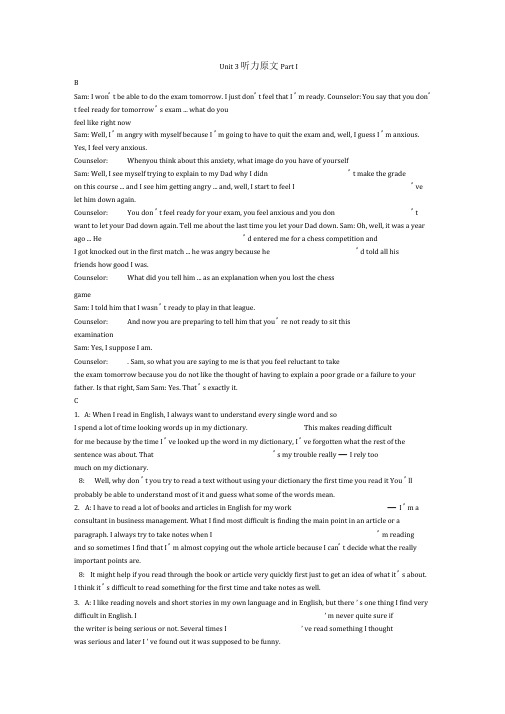
Unit 3 听力原文Part IBSam: I won’ t be able to do the exam tomorrow. I just don’ t feel that I ’ m ready. Counselor: You say that you don’ t feel ready for tomorrow ’ s exam ... what do youfeel like right nowSam: Well, I ’ m angry with myself because I ’ m going to have to quit the exam and, well, I guess I ’ m anxious. Yes, I feel very anxious.Counselor: Whenyou think about this anxiety, what image do you have of yourselfSam: Well, I see myself trying to explain to my Dad why I didn ’ t make the gradeon this course ... and I see him getting angry ... and, well, I start to feel I ’ ve let him down again.Counselor: You don ’ t feel ready for your exam, you feel anxious and you don ’ t want to let your Dad down again. Tell me about the last time you let your Dad down. Sam: Oh, well, it was a year ago ... He ’ d entered me for a chess competition andI got knocked out in the first match ... he was angry because he ’ d told all hisfriends how good I was.Counselor: What did you tell him ... as an explanation when you lost the chessgameSam: I told him that I wasn ’ t ready to play in that league.Counselor: And now you are preparing to tell him that you ’ re not ready to sit thisexaminationSam: Yes, I suppose I am.Counselor: . Sam, so what you are saying to me is that you feel reluctant to takethe exam tomorrow because you do not like the thought of having to explain a poor grade or a failure to your father. Is that right, Sam Sam: Yes. That ’ s exactly it.C1.A: When I read in English, I always want to understand every single word and soI spend a lot of time looking words up in my dictionary. This makes reading difficultfor me because by the time I ’ ve looked up the word in my dictionary, I ’ ve forgotten what the rest of the sentence was about. That ’ s my trouble really —I rely toomuch on my dictionary.8:Well, why don ’ t you try to read a text without using your dictionary the first time you read it You ’ ll probably be able to understand most of it and guess what some of the words mean.2.A: I have to read a lot of books and articles in English for my work —I ’ m a consultant in business management. What I find most difficult is finding the main point in an article or a paragraph. I always try to take notes when I ’ m reading and so sometimes I find that I ’ m almost copying out the whole article because I can’ t decide what the really important points are.8:It might help if you read through the book or article very quickly first just to get an idea of what it ’ s about.I think it ’ s difficult to read something for the first time and take notes as well.3.A: I like reading novels and short stories in my own language and in English, but there ’ s one thing I find very difficult in English. I ’ m never quite sure ifthe writer is being serious or not. Several times I ’ ve read something I thoughtwas serious and later I ’ ve found out it was supposed to be funny.B: I have exactly the same problem. I suppose the only thing to do is to read as much as possible. Then one day perhaps we’ ll understand the British sense of humor. 4. A: I have to read a lot in English in my studies and this is causing me problems. I read too slowly in English. Do you think I can train myself to read quickly and at the same time understand what I ’ m readingB: Well, there are special courses in speed reading, I think. But you could probably help yourself if you set yourself a time limit and try to read as much as you can within the time. I ’ ve done that and it ’ s helped me a lot. Part n (Part I)Yes, the teacher I remember best was a teacher I had for French when I was at school ... er ... er ... Many years ago - more years than I care to remember, I ’ m afraid. Yes, I studied French with him for, um, ooh, let me see, it must have been five years, because I had him when I was in my first year there, when I was thirteen,and he was the main French teacher till I left. It was mainly because of him thatI went on to study languages — French and German — at university. I mean, French was really the first language I ever learned. Well, I don ’ t count Latin, becauseI never managed to speak any Latin at all. Er, well, this ... this teacher didn ’ t make it easy ... he didn ’ t make it easy at all, but I found that with him I really learned a lot.When I think back, I ... don ’ t really know why I liked him so much, because he was very strict with us. He made us work very hard — I mean, lots of grammar exercises, vocabulary tests, that sort of thing — er, and he wasn’ t very friendly either, for the first two or three years. Oh, as well as that, he didn ’ t reallytry to make the classes interesting — I mean, no ... no video, of course, in those days, no cassettes ... but, er, we had a few films in French every term. No, in fact, the only time we really practiced trying to speak French was, er, was with the wife of one of the music teachers, who was French, er, and she gave us an hour ’ s conversation class every week. But, you know, because of that man — some people might say in spite of him ... no, that wouldn ’ t be fair, no — but quite a lot ofus began to like France and the French a lot, and, er, to visit France in the summer holidays to see it for ourselves. (Part II)Yes, I think with him I learned that when you learn a foreign language ... it ' s, it ... well, it ' s like opening a door or a wi ndow into a foreigncountry. And that ’ s good for you, I think, because you begin to see that the way they do things and think in your country is, um, isn ’ t necessarily the only wayor, indeed, the best way.It ’ s funny, I still have a very clear picture of that teacher. He was English but he didn ’ t look English somehow, ‘ cos he had very, very black hair and verydark eyes, and he wore glasses with black frames, but you could see his eyes verywell, and everyone in the class always had the feeling that he was looking at them.And he had very thick, bushy eyebrows that made him look very, er, very serious.Yes, I remember he was very musical —played the piano very well and sang.Now, he was quite a good rugby and tennis player. Great family man, too. He had three children and a very interesting wife. I suppose he must have been in his thirties when I knew him ...Part 出Children of a Decadekeep in touch with :保持联系soak :浸泡come to :到达; 共计; 突然想起put sb. off :使人离开、气馁bring tears to :使落泪emblazon :颂扬,盛饰decade :十年teddy :妇女连衫衬裤chap :小伙子,小家伙,家伙Lake District :湖区porridge :粥; 麦片粥; 稀饭incident :事件,事变goody-goody :会巴结的人hymn :赞美诗;圣歌homesick :思乡病favorite :中意的worst :最坏的marvelous :非凡的; 神乎其神shy :害羞的stupid :笨Presenter: In this edition of our series “ Children of a Decade” I ’ ll be talkingto Jack Thompson, who was born in 1940, and to Shirley Sutton, who was born in 1930. First of all, Jack, thanks for joining us. Perhaps ...Jack: Not at all.Presenter: Perhaps you ’ d tell us about your memories of your first holiday away from homeJack: Oh ... yes ... um ... at age ten I think it was, yes, I went to stay with anaunt at the seaside. Well, it wasn’ t a very happy experience. I felt very homesick at first.Presenter: Mmm. And what about your first day at school, can you remember thatJack: Yes, I can. Er ... er ... I was five years old and I wanted to take all mytoys with me but ... er ... they wouldn ’ t let me. In the end it was agreed thatI could take my teddy ... er ... but only on the first day.Presenter: Oh, I see. Your school days, were they happy onesJack: Well ... er ... I didn ’ t have a very good time at school —I wasn ’ t verybright, you see. And the teachers didn ’ t seem to like me, but ... er ... I madea lot of friends and some of them I still keep in touch with. One of them I married. Presenter: Oh, that ’ s wonderful. Well, did you have a favorite teacherJack: Miss Robinson ... or was it ... no, it was Miss Robson. My first teacher, that ’ sright yeah ...very kind. Marvelous storyteller.Presenter: And who was your worst teacherJack: Mr. Goodman, that ’ s right. We used to call him “ Goody” . Yeah, he pulled your ear if you madea mistake or talked in class. Yeah, my left ear is still bigger, look.Presenter: Ha ha. Perhaps you can tell us about your last day at schoolJack: My last day, oh yeah, that ’ s emblazoned on my mind. Oh, I wanted to get my own back you see on old Mr. Goodman —the chap we used to call ... er ... “ Goody”—so I put this bucket of water over the classroom door but it fell on him and he got soaked, you see. Ha ha. I ’ ve never seen anyone so angry. Oh, it was a good one, that.Presenter: Thank you very much, Jack. And now Shirley.Shirley: Yes.Presenter: Now, can you tell me about your first holiday away from homeShirley: Oh yes ... er ... yes ... er ... at the age of eight it was. We went on holiday to the Lake District. Westayed at alittle guest house, just meand my parents. Er ... I remember we had ... er ... honey for breakfast with ... er ... thetoast and ... oh ... and porridge —I hated it.Presenter: That sounds lovely Oh, porridge, you hated itShirley: Ha ha.Presenter: Well, what about your first day at schoolShirley: Well, I ... I ... I don ’ t remember any special incidents ... er .................. O h,I was very frightened and shy at first ... er ... I ... I know that, I can remember, but I soon came to enjoy school.Presenter: So your school days, were they happyShirley: Oh yes, I loved school! Oh, I was sorry when half-term came and... and whenthe holidays came. Oh, perhaps this was because I was a bit of a goody-goody.Presenter: And what about your teachers Did you have a favoriteShirley: I did, yes. I remember her well, she was called Miss Brown and she was our history teacher. Oh, she really made history come to life, she really did.Presenter: Were there any bad moments Did you have a worst teacherShirley: Aye, I did and I can remember her name too. Her name was Mrs. Sharpe and she taught math. Oh, shehad no patience. I wasn ’ t all that good at math and shealways said to me, “ You stupid girl! ” It put me off math for life.Presenter: Oh, what a shame.Shirley: I know.Presenter: Perhaps you could tell me about your last day at schoolShirley: Oh yes, well, I ’ m afraid I cried. We sang our favorite hymn at the end of the term and I cried. It brought the tears to my eyes.Presenter: Oh, and it ’ s bringing a tear to my eye now. Thank you very much.Shirley: Thank you.Presenter: And thank you too, Jack Thompson, thank you very much. Next week we’ ll be hearing from two people who were born in 1920 and 1910. So from me, Libby Freeman, good-bye.Part IVSchool reportschool report :学生成绩报告单safety :安全quality :质量empowered :授权; 准许; 使能够involvement :投入,介入guarantee :保障superior :(级别、地位)较高的; (在质量等方面)较好的;(数量)较多的; 上...concentrate :集中comment :评论intelligent :聪明的;[ 计] 智能的give up on sb :放弃biology :生物学; 生物well above :好于guide back :保证geography :地理(学)oral :口头go to pieces :零散average :平均positive :积极come bottom :打底attitude :态度look on the bright side :看好的一面hockey :曲棍球Mrs. Daniels: Oh, hello, you must be Tracey ’ s parents Mr. Thompson: Er, yes. Are you her class teacher, Mrs. DanielsMrs. Daniels: Yes, that ’ s right. Now, just let mefind mynotes. As you know I don’ t actually teach Tracey, but I do see her every day before classes begin. Is there anything you want to ask meMr. Thompson: Well, yes, to be honest we ’ re a bit worried about her last report-- she doesn ’ t seem to be doing as well as she was.Mrs. Daniels: Well now, let ’ s see. Oh, yes, her math teacher says she ’ s finding the work more difficult now that they ’ re getting near to the exams. Mrs. Thompson: I was never any good at math.Mrs. Daniels: And Dr. Baker feels that Tracey isn ’ t concentrating very hard in biology lessons.Mrs. Thompson: Oh, but she really likes biology and she ’ s so good at drawing.Mrs. Daniels: Yes, but even in art her teacher thinks she tends to spend too muchtime talking to her friends. In fact, several of her teachers have told me that sheisn ’ t giving in her homework. Mr. Brock has complained to me that he hasn a single piece of geography homework from her all term.Mr. Thompson: Yes, we don ’ t know what to do about it. She doesn ’ t seem to beinterested in school any more.Mrs. Daniels: I don ’ t think we should give up on her. Tracey ’ s a very intelligent girl. In English her marks are well above the average and her teacher says she always has a lot to say in lessons. Mrs. Thompson: Yes, that ’ s part of Tracey ’ s trouble. She talks too much.Mrs. Daniels: Well, nevertheless, oral skills are very important and if we can allguide her back to a more positive attitude to school work, she’ ll do very well.Mr. Thompson: Well I hope so. I ’ m very disappointed in her. She was doing so well, especially in English and French, and now everything seems to be going to pieces. She came bottom of the class in French this term. ’ s not because she can ’ t do French — she just prefers to least she ’ s doing well in sport. She ’ s in the hockey team and t lost a single match this year!’ s nice to know she does something well.Mrs. Daniels: Oh, come now, Mr. Thompson, let ’ s look on the bright side.Part V Memory test: Study HabitsMan: Do you find that you get a lot of students asking you for advice about revision techniquesWoman: Well, yes, I mean, they do, but, when they ’ ve got quite big exams comingup, (yeah), you know I really find it quite a problem because (pause) (laugh) well, I don ’ t have to revise myselfvery often these days, and ... but when I ... whenI was at university, erm I mean, well, it just seems to be a matter of what suits one person doesn ’ t suit another. (Oh yeah) I mean, because, well, the girl I shared a house with at university. Now she worked, erm, she used to get up amazingly late, and, er, she didn ’ t really start work until, er, in the evening I think, an ’ , then she liked to have rock music on really loud an ’ she used to, you know, play records really loud right through until sort of very late at night, you know, into the small hours (Oh God!) and I was, sort of, well I was just the opposite and er, well, theonly way I could ever get any work done was to make myself wake up incredibly early and well, then work a bit and have some breakfast and, then, well, you know, I’ dsort of potter about a bit and then I ’ d go and do my shopping and things, well that ’ dbe about getting on towards midday, but then in the afternoon I’ d have a rest andwhen I woke up I ’ d think about eating and I suppose I ’ d call that my supper, and but, er, I mean she was, Imean, it was her lunch or even her brunch that she was having at that time.Man: Yeah, yeah, I suppose I ’ m a bit like you really. I like to get up fairly early, say around seven, might have a cup of coffee, and... before I started get myself totally organized so that I knew ... exactly what I was doing, get it all organized, and then work solidly, well maybe do six hours revision without stopping and that was the only way I could do it.Woman: Yes, yes, and would you say to yourself, you know, er,“ well, I ’ m gonnado six hours today and I ’ m not gonna, go, I ’ m not gonna have any fun until I done six hours, ”Man: Yeah, it was very much like that, erm, an unpleasant thing that you had to regulate.Woman: Mmm.I mean, well, I just hate revising anyway, I mean, you know I hate that sort of thing, I mean, and in fact, I did very little solid, sensible work, and, er ... what I ’ d do is, because I was doing literature, I used to re-read the novels, you know, on the course, and I ’ d have ... erm ... classical music on the radio, because well I used to find that I used to get very bored if there was just nothing, you know nothing at all in the background. Man: Yes, I think of the people who do revise, there are two sorts, there are those who ... work almost by topic, they select a topic, and plough through it regardless, and then, there are, there are those who set themselves a time limitt had Mrs. Daniels: Well it chat in English! At you know we haven ’ Mr. Thompson: Well, itveof an amount to be done rather than working through a specific topic regardless of the limit ... of time ... as I say ...。
人教版英语八年级上册Unit 3听力原文及翻译(旧版)
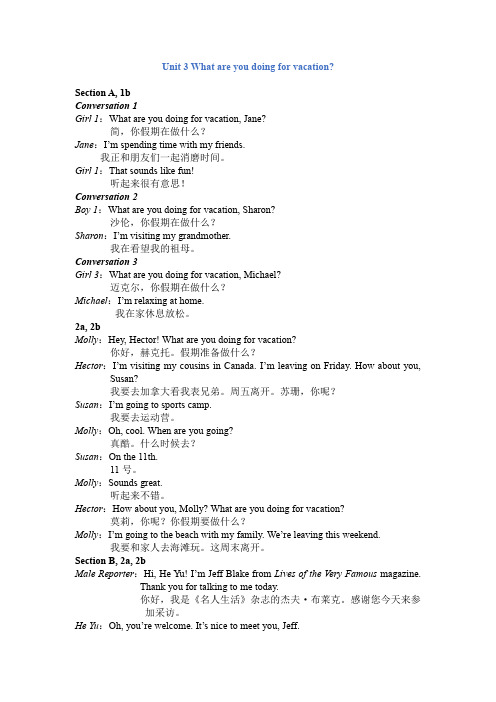
Unit 3 What are you doing for vacation?Section A, 1bConversation 1Girl 1:What are you doing for vacation, Jane?简,你假期在做什么?Jane:I’m spending time with my friends.我正和朋友们一起消磨时间。
Girl 1:That sounds like fun!听起来很有意思!Conversation 2Boy 1:What are you doing for vacation, Sharon?沙伦,你假期在做什么?Sharon:I’m visiting my grandmother.我在看望我的祖母。
Conversation 3Girl 3:What are you doing for vacation, Michael?迈克尔,你假期在做什么?Michael:I’m relaxing at home.我在家休息放松。
2a, 2bMolly:Hey, Hector! What are you doing for vacation?你好,赫克托。
假期准备做什么?Hector:I’m visiting my cousins in Canada. I’m leaving on Friday. How about you, Susan?我要去加拿大看我表兄弟。
周五离开。
苏珊,你呢?Susan:I’m going to sports camp.我要去运动营。
Molly:Oh, cool. When are you going?真酷。
什么时候去?Susan:On the 11th.11号。
Molly:Sounds great.听起来不错。
Hector:How about you, Molly? What are you doing for vacation?莫莉,你呢?你假期要做什么?Molly:I’m going to the beach with my family. We’re leaving this weekend.我要和家人去海滩玩。
九年级英语(上)UNIT 3 教材听力原文及汉语翻译

y ouGirl: Yes. Go along Center Street and then turn leftwhenGirl: I think it closes at 7:00 p.m. t oday.Listen. You will hear some of the directionsinleft.bookstore.between the flower store and the bookstore.Boy 2: Yo u’re welcome.Listen again. Draw a line in the picture above to show how the boy walks to the supermarket.Boy 2: Yes. Go to the second floor and then…t hensupermarkettoClerk: Of course. There are a lot of good restaurants in Sunville. What kind of food are you lookTh eymuseums. They’re fascinating.museumsLet’s go to a science museum.Clerk: Why don’t you go to the computer museum?There are a lot of fun things for children there.learnClerk: Of course. ThereBoy: I’d like fresh vegetables.Boy: Science? We always go to scie nce museums. I want to go to a children’s museum. They’re more fun.Girl 2: Well, I’m too old for a children’s museum. Why don’t we go to an art museum?Clerk: Why don’t you go to the computer museum? There are a lot of fun things for children there.You can learn all about the history of computers, as well as learn a bout science.Mother: That’s a great idea! Let’s go to the computer museum.。
新标准大学英语视听说教程听力原文Unit3New

Unit 3-Conversation 1Kate :Are you on your way to the boathouse?Janet :No. What's happening?Kate : There's a practice race to help choose who will rowon the college team. Mark really wants a place on the team,so he has to row well today. And I'm going to watch.Janet : Well, I'd like to, but I have an essay to finish.Kate : That's too bad! I know how you feel.Janet :Maybe I can come later?Kate : Sure. I'm thinking of having lunch in the boathouse bar, and then watching the rowing all afternoon.Janet :How do I get to the boathouse?Kate : It's easy. Can you see where we are on the map? Here, look!Janet : OK, which way round are we standing? ... Yes, got it! Kate : OK, go down Catte Street, and turn right into the High Street. Go along the High Street and turn left into St Aldates. Walk along St Aldates, past Christ Church College until you get to Folly Bridge.Janet : I see.Kate : Then when you get to the bridge, cross over the river ... turn left and walk along the river bank. Keep going along the river ... And you're there! The boathouses are on the right, and the Hertford College Boathouse is the last one along. You can't miss it.Janet : Thanks. I'm looking forward to seeing the rowing. Kate : No problem. We shouldn't miss the rowing — it's a great university tradition!Janet :I know, Mark was telling me.Kate : Like the boat race between Oxford and Cambridge universities every year.Janet : Of course! The great rivals!Kate : The Boat Race has been going for years, maybe nearly 200 years.Janet :And Oxford won it this year!Kate : Yes, but Cambridge was very close behind. Anywaysee you later, down by the river. Janet : Bye.Unit 3-Conversation 2Kate : So the rules are ... the boats follow each other and the one behind has to bump the one in front ... just like that one has done.Janet :Is that Mark's boat?Kate :Yes! Look, his boat is about to bump the one in front!Well done!Mark : Hi you guys!Kate :Fantastic, Mark. You were amazing!Mark : Well,we won the practice race, but I'm worried about getting a place on the team.The problem is that there are at least three other people on the team who have rowed before.And I can't help thinking that they were better than me. Janet :Don't worry, Mark. Everything will be OK.Mark :And then I hurt my knee getting into the boat.Janet : Oh, I'm so sorry!Kate : Too bad, but it's only a scratch. Listen up, Janet is right.No need to get nervous, Mark. You were the strongest lookingguy in the boat today. Chill out!Mark :Hey, they're putting the team list on the door.Janet :Let's go over and see.Mark :No, you go! I can't bear to look!Kate : OK.Kate : Hey, Mark, great news! You got a place on the collegeteam!Janet :Congratulations!Kate : That's great, Mark, you deserve it. You trained so hard.Mark :I can't believe it!Unit 3-Outside viewPart 1Narrator: A historic moment, and yet he made it so easy.Usain Bolt became the first man to successfullydefend both the 100- and 200-meter Olympic sprinttitles, and he went on to anchor Jamaica’ s winnrun in the four by100hundred meters relay inworld record time. At the end of that race, Bolt gavea nod to another track star with a“ Mobot ”signature of Mo Farah,who became only theseventh person ever to win the 5000 and 10000double, in front of an ecstatic home crowd.Mo Farah: I t ’ s not going to affect me, I ’ m the sameto oldMo, nothing ’ s going to change. It just means yougot two good medals and ⋯ but something you ’ veworked so hard for, I st ’goingmjuto enjoy it.Narrator:Also a legend in the making,Kenyan DavidRudisha, who smashed the 800 meters record whichhad stood since 1976.Swimmer Michael Phelps broke anotherlong- standing record. He became the world’mostsuccessful Olympian with22 medals, 18of themgold,breaking the record set in1968.His lastpodium before retiring was an emotional moment.Phelps: Yeah, as soon as I stepped up, ah, onto the podium,I ⋯ I could feel the tears starts coming.And, youknow, I said to Nathan, I said, “ Uh-oh,here theycome. This could be⋯ this could be pretty brutal uphere. ” And they just started coming. And I tried tofight it but then I just⋯ justI decided just to let itgo.Part 2Narrator:Tears too for cyclist Chris Hoy, who becameBri tain ’ s most successful Olympian, with six golds.And then there were also moment of anguish andfrustration. China’ s star hurdler Liu Xiang crash oof his second consecutive Olympics, and Brazil ’ sfootballers once again failed to lift gold.These games were also marked by women.Teenagers Ye Shiwen,Katie Ledecky and Missy文档Franklin set record times in the pool. Saudi Arabia, Brunei and Qatar sent female athletes foe the first time. Women’ sboxing became an Olympic sport. And British poster girl Jessica Ennis gave the home nation a defining moment when she took heptathlon gold. She was at the forefront of the team GB’ s biggest medals haul of modern times, coming thirdin the medal table. The United States regained their place at the top, with China coming second. For some though, it wasn’about the medals. But it ’ s the taking part that counts.danger.Speaker 1 He does like to punch the ball, that Kopke in the German goal... England's first corner of this semi-final... Gascoigne will take it... Here comes the comer kick from Gascoigne ... and Shearer's there and Alan Shearer scores for England ... England have scored after only two minutes' play ... with a comer kick by Gascoigne ... aimed at the near post, and Alan Shearer heads the ball into the German goal ,.. It's an absolute dream start for the semi-final ... Shearer has got his fifth goal of the tournament... Would you believe it?It's England one, Germany nil!Passage 2News report Matt Now it's time for Critic's Choice, with news and reviews about the latest films.Good evening,Jack,seenThere ’ sa new fitness trend in Australia called anything good at the cinema this week?“ crunning It” ’.as new sport that combines crawling and Jack Good evening Matt, yes, I've seen one of the best running that involves using your hands and feet on the ground.sports films of recent years.The idea was started by Melbourne resident Shaun McCarthy,Matt Sports films? That's not usually a type of film which and he hopes it will spread to other countries.appeals to you.McCarthy can ’provet that crunning is more beneficial Jack You're right, but this time it's different. I've been to than traditional running.However, he believes that it is a see a film about mountain climbing,it's not really your better way to exercise because it involves using your upper typical sports film. It's more man against the mountain.body as well as your lower body. Therefore it provides a Matt Tell us more.complete body workout.He also said that crunning burns Jack I've been to see Touching the Void, which is the story more calories than running.of a pair of mountain climbers in the Peruvian Andes.Experts aren ’ t sure if crunning is actuallyafesexercise Matt Is it a true story?for people. Unlike animals, humans are not built to move on Jack Yes, it is. In 1985, Joe Simpson and Simon Yates set all four limbs. People’ s wrists are not as strong as their ankles,the 7,000-metre Siula Grande mountain in theout to climband crunning can place a large amount of pressure on the Peruvian Andes. Simpson and Yates were young, fit and wrists as well as their elbows and shoulders. It could result in confident they would succeed.an injury to the lower back, shoulders, elbows or wrists.Matt So what happens?Jack Simpson and Yates' style of climbing involved1 What do we learn about the new sport?moving quickly up a mountain with very few supplies and no2 What do experts think about the new sport?base camps, which is risky. You can't make any mistakes.Matt I think I can guess what happens next.Passage 1Jack And sure enough after climbing well for three and aSpeaker 1 And David Seaman is in goal for the England half days, disaster strikes. Simpson falls and breaks his right leg. With no food or water, the climbers know they have toteam down to our right... it's difficult to get used to the changeget off the mountain - fast. Yates is determined to find a wayof team colours here ... I'm looking at the white shorts andto get his friend home, and he has to lower Simpson down the thinking they're English players, but they're not. For thismountain. Simpson is in agony,but Yates has no choice match it's the Germans who are wearing white. I hope theexcept to ignore his partner's cries of pain because otherwise English players don't have the same problem, we don't wanthe'll die.them to pass the ball to the Germans. Now Gascoigne forWell, for a while, things go well. But suddenly Simpson, England passes to McManaman for the first time ...at the end of the rope, fails to respond to Yates' signal. Yates McManaman is immediately surrounded by three Germanis unable to move any further and has no idea why Simpson is defenders ... he brings the ball to the near side of the pitch ...not responding. So Yates holds on with all of his strength, all still McManaman for England, crosses the ball to Pearce ...too aware that eventually his strength would give out and Pearce takes a shot! ... saved by the German Ziegler, andboth would fall.picked up by Ince only 25 yards away from the GermanBut what Yates doesn't know is that he has lowered goal... good effort by Ince, aims at the goal! ... and Kopke, theSimpson over the edge of a crevasse. Simpson is hanging in German goalkeeper pushes the ball over the top of the goal.mid-air from the vertical face of the mountain. He's unable toSo a comer kick for England.climb back up the rope and he's got frostbitten fingers and Speaker 2 A great shot by Ince, I'm sure he knows thatcan't communicate with Yates above him.Pearce set that up for him,but Kopke put the shot out of文档Unit 3-Listening inMattSo what happens?JackWell, I don't want to spoil the ending for anyone whohasn't seen it yet.MattBut...JackBut Yates hangs onto the rope for an hour, gettingweaker. For any climber, cutting the rope that binds him to his partner is unthinkable.MattSounds very exciting. So what about the directionand the filming?JackThe director is Kevin Macdonald, and he tells thestory by cutting from interviews to shots of the climb itself.But it's the message of the film which interests me. You see,in the end, the impression left by the film is astonishment thata human being could do what Joe did, which is to survive. MattThanks Jack, this week's Critic's Choice isTouching the Void, on general release in all cinemas from next Week.文档。
人教版英语九年级全一册Unit3听力原文及翻译

人教版英语九年级全一册Unit3听力原文及翻译Unit 3 Could you please tell me where the restrooms are?Section A, 1bConversation 1Girl:Excuse me, could you tell me where I can buy some stamps?打扰一下,你能告诉我哪儿能买些邮票吗?Boy:Yes. There’s a post office on Center Street.可以。
在中央大街有个邮局。
Girl:Oh, could you tell how to get to Center Street?哦,你能告诉一下怎么去中央大街吗?Boy:Sure. You see that bank there?当然。
你看到那边的银行了吗?Girl:Hmm…oh, yes.嗯,看到了。
Boy:Just go past the bank and then turn right. The post office is on the right, next to the library.就经过那个银行,然后向左转。
邮局就在右边,图书馆的旁边。
Girl:Thanks a lot!非常感谢!Conversation 2Boy:Excuse me, do you know where I can get a dictionary?打扰一下,你知道哪儿能买到字典吗?Girl:Sure. There’s a bookstore on Main Street.当然。
在主街有个书店。
Boy:Oh, could you please tell me how to get there?哦,你能告诉我怎么去那儿吗?Girl:Yes. Go along Center Street and then turn left on Main Street. Then you will see the bookstore on the other side of thestreet.可以。
- 1、下载文档前请自行甄别文档内容的完整性,平台不提供额外的编辑、内容补充、找答案等附加服务。
- 2、"仅部分预览"的文档,不可在线预览部分如存在完整性等问题,可反馈申请退款(可完整预览的文档不适用该条件!)。
- 3、如文档侵犯您的权益,请联系客服反馈,我们会尽快为您处理(人工客服工作时间:9:00-18:30)。
Unit 3 How do you get to school?Section A1b Listen and write the numbers next to the correct students in the picture above.Boy: How do Bob and Mary get to school?Girl: Bob takes the train and Mary takes the subway. Boy: How does John get to school?Girl: He takes the bus.Boy: How do Paul and Yang Lan get to school?Girl: They walk. Look, there they are now!Boy: Does Jim walk to school?Girl: No, he doesn’t. He rides his bike.2a Listen and repeat. Then write the correct number next to the word.61,72,84,99,105,2002b Listen and complete the chart. Conversation 1Mary: How do you get home from school, Tom? Tom: I walk.Mary: How long does it take?Tom: It takes about 20 minutes.Mary: Wow! That’s quick! How far is it from the school to your home?Tom: Only about two kilometers.Conversation 2Peter: How do you get home from school, Jane? Jane: I take the bus.Peter: How long does it take?Jane: Oh, about one hour and 30 minutes.Peter: Wow! That’s a long time!Jane: Yes, I only go home on weekends.Peter: How far is it from your home to school? Jane: It’s about 60 kilometers.2c Listen again. Check your answers in 2b. 听录音,并在上面图片中正确的学生旁标上数字。
男孩:鲍勃和玛丽怎样到学校?女孩:鲍勃乘火车,玛丽乘地铁。
男孩:约翰怎样到学校?女孩:他乘公共汽车。
男孩:保罗和杨兰怎样到学校?女孩:他们步行。
看,他们现在在那儿!男孩:吉姆步行去学校吗?女孩:不,他不步行。
他骑自行车。
听录音并跟读。
然后在单词旁边写出正确的数字。
六十一,七十二,八十四,九十九,一百零五,二百听录音,完成表格。
对话1玛丽:汤姆,你怎样从学校回家?汤姆:我步行。
玛丽:花费多长时间?汤姆:大约花费20分钟。
玛丽:哇!那很快啊!你家离学校多远?汤姆:大约只有两千米。
对话2彼得:简,你怎样从学校回家?简:我乘公共汽车。
彼得:花费多长时间?简:噢,大约1小时30分钟。
彼得:哇!那花费很长时间啊!简:是的,我只在周末回家。
彼得:你家离学校多远?简:大约60千米。
再听一遍录音,检查2b中的答案。
Conversation 1Mary: How do you get home from school, Tom? Tom: I walk.Mary: How long does it take?Tom: It takes about 20 minutes.Mary: Wow! That’s quick! How far is it from the school to your home?Tom: Only about two kilometers. Conversation 2Peter: How do you get home from school, Jane? Jane: I take the bus.Peter: How long does it take?Jane: Oh, about one hour and 30 minutes.Peter: Wow! That’s a long time!Jane: Yes, I only go home on weekends. Peter: How far is it from your home to school? Jane: It’s about 60 kilometers.Section B1c Listen and check(√)the things that Mary wants to know.Mary: I love your home, Bob. It’s so big!Bob: Thanks, Mary. My grandparents’ home is very big, too.Mary: Where do they live?Bob: Very far from my home.Mary: Oh, how far?Bob: It’s about 500 kilometers from here.Mary: Wow! That’s far.Bob: Yes, it is. So I go there and see my grandparents only one or two times a year.Mary: How do you get there?Bob: I usually take the train.听录音,并在玛丽想知道的事情前打“√”。
玛丽:鲍勃,我喜欢你的家。
它真大啊!鲍勃:谢谢,玛丽。
我外祖父母家也很大。
玛丽:他们住在哪儿?鲍勃:离我家很远。
玛丽:哦,多远?鲍勃:离这儿大约500千米。
玛丽:哇!那很远。
鲍勃:是的,所以每年我去那儿看我外祖父母仅一两次。
玛丽:你怎样去那儿?鲍勃:我通常乘火车。
对话1玛丽:汤姆,你怎样从学校回家?汤姆:我步行。
玛丽:花费多长时间?汤姆:大约花费20分钟。
玛丽:哇!那很快啊!你家离学校多远?汤姆:大约只有两千米。
对话2彼得:简,你怎样从学校回家?简:我乘公共汽车。
彼得:花费多长时间?简:噢,大约1小时30分钟。
彼得:哇!那花费很长时间啊!简:是的,我只在周末回家。
彼得:你家离学校多远?简:大约60千米。
鲍勃:我通常乘火车。
玛丽:花多长时间?鲍勃:花大约六个小时。
然后我从火车站乘公共汽车去他们家。
玛丽:哇,那是一段很长的旅程。
Mary: How long does it take?Bob: It takes about six hours. And then I take a bus from the train station to their home.Mary: Wow. That’s a long trip.1d Listen again. How does Bob get to his grandparents’ home?Check(√)1 or 2.Mary: I love your home, Bob. It’s so big!Bob: Thanks, Mary. My grandparents’ home is very big, too.Mary: Where do they live?Bob: Very far from my home.Mary: Oh, how far?Bob: It’s about 500 kilometers from here.Mary: Wow! That’s far.Bob: Yes, it is. So I go there and see my grandparents only one or two times a year.Mary: How do you get there?Bob: I usually take the train.Mary: How long does it take?Bob: It takes about six hours. And then I take a bus from the train station to their home.Mary: Wow. That’s a long trip.玛丽:花多长时间?鲍勃:花大约六个小时。
然后我从火车站乘公共汽车去他们家。
玛丽:哇,那是一段很长的旅程。
再听一遍录音。
鲍勃怎样到他祖父母家?在1或2前打“√”。
玛丽:鲍勃,我喜欢你的家。
它真大啊!鲍勃:谢谢,玛丽。
我外祖父母家也很大。
玛丽:他们住在哪儿?鲍勃:离我家很远。
玛丽:哦,多远?鲍勃:离这儿大约500千米。
玛丽:哇!那很远。
鲍勃:是的,所以每年我去那儿看我外祖父母仅一两次。
玛丽:你怎样去那儿?鲍勃:我通常乘火车。
玛丽:花多长时间?鲍勃:花大约六个小时。
然后我从火车站乘公共汽车去他们家。
玛丽:哇,那是一段很长的旅程。
